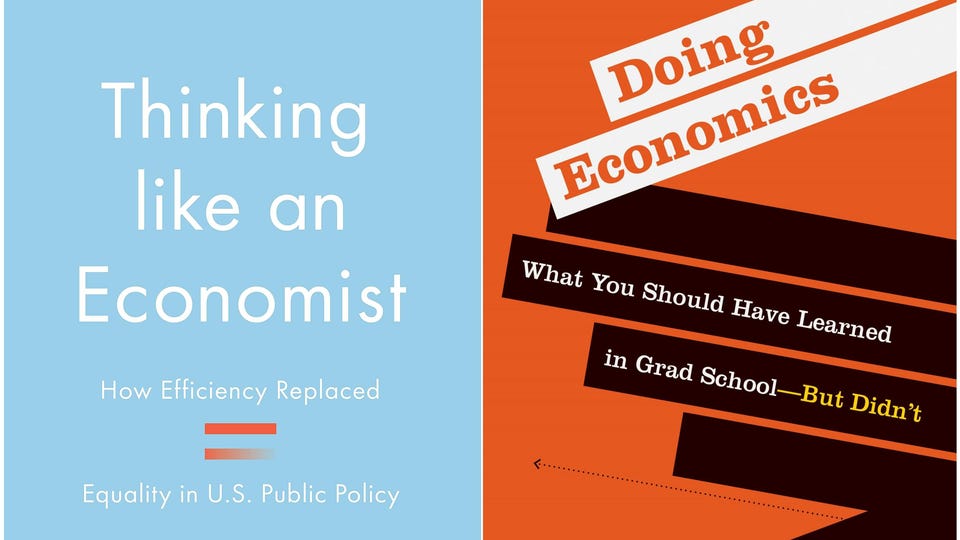Science The Psychology Of An Economist, Through Two Books Jonathan Wai Contributor Opinions expressed by Forbes Contributors are their own. I write about psychology and education research and policy. New! Follow this author to improve your content experience.
Got it! Jun 27, 2022, 05:40pm EDT | Share to Facebook Share to Twitter Share to Linkedin Economists seem to be everywhere nowadays. Economics, after all, is one of the most influential if not the most influential of the social sciences (don’t worry fellow psychologists, I think you’re great too). Even when I was getting a PhD in psychology studying quantitative methods, gifted education, and talent development, I often read the work of economists that study human capital development, such as Claudia Goldin , Enrico Moretti , and Garett Jones since their work was relevant to my own.
Now in the field of education policy, I’ve discovered that economists and their tools are extremely influential. For example, for the first time there is now a chief economist of the U. S.
Department of Education, seeming to mimic the structure of chief economists at many major companies. Thinking like an economist and Doing economics book covers Elizabeth Popp Berman and Marc F. Bellemare How did economists become so influential? To better understand how economists have become so influential, turning to the in-depth historical research of a sociologist clearly obsessed with this question is extremely helpful to any outside observer.
Elizabeth Popp Berman’s new book Thinking like an economist: How efficiency replaced equality in U. S. public policy provides, in the words on the publisher’s page, “The story of how economic reasoning came to dominate Washington between the 1960s and 1980s—and why it continues to constrain progressive ambitions today.
” For me at least, reading the book was extremely insightful from a psychological perspective to understand the sociological and historical way of seeing how the economic style of reasoning become so influential and popular, and to recognize that this is what it is, an influential style or way of thinking and approaching problems, often using highly technical econometric tools . How can one think more like an economist? To better understand the psychology of an economist, it is extremely useful to read career advice books written by economists themselves. One book I found helpful is The Economist’s Craft by Michael S.
Weisbach. However, the book that really helped me understand the economic style of reasoning and approaching problems is Doing economics: What you should have learned in grad school—but didn’t by Marc F. Bellemare .
Marc’s book is extremely insightful because he provides in great detail and clarity the hidden curriculum that is unique to the economics profession regarding getting through grad school, publishing, getting a tenure track or other job, and really becoming a research economist. Though absolutely written primarily for aspiring economists or many of the adjacent academic fields that are influenced by economists (e. g.
, political science, public policy), I found it most helpful to understand the incentive structure of economics, for better or worse, which helps explain the way economics papers are written and the types of language, frameworks for thinking, and terms that are used by economists. What might economists learn from other disciplines? Economics as a profession has become extraordinarily influential across the social sciences and all areas of policy. Thus, it is useful to read these books for anyone who comes from different disciplines, such as the one I originally was trained in, psychology, especially if one wants to understand how to better influence policy research.
Though all of us outside of the field of economics could benefit from the books that help explain the psychology of economists, it is also worthwhile for economists to think more deeply about what they can learn from other disciplines as well. To that end, here are many more career resources from disciplines such as psychology, engineering, science writing, and science in general. As Catherine Lyall has argued, scientific advance is multidisciplinary , and innovation often comes when people with different perspectives are open to learn from one another and fruitfully work together.
This is most clearly expressed in the diagram provided by the computer scientist Matt Might, showing that a PhD in any given field often leads one to see the world in one specific way , and that it’s always good to remember the much larger scientific and societal picture. Follow me on Twitter . Check out my website .
Jonathan Wai Editorial Standards Print Reprints & Permissions.
From: forbes
URL: https://www.forbes.com/sites/jonathanwai/2022/06/27/the-psychology-of-an-economist-through-two-books/



